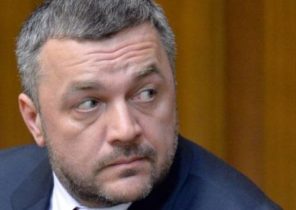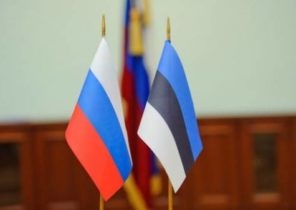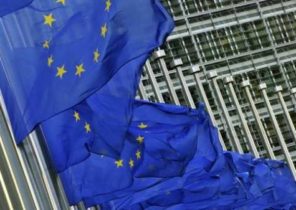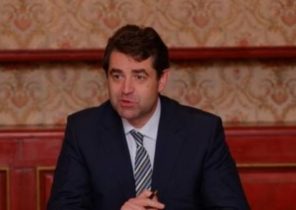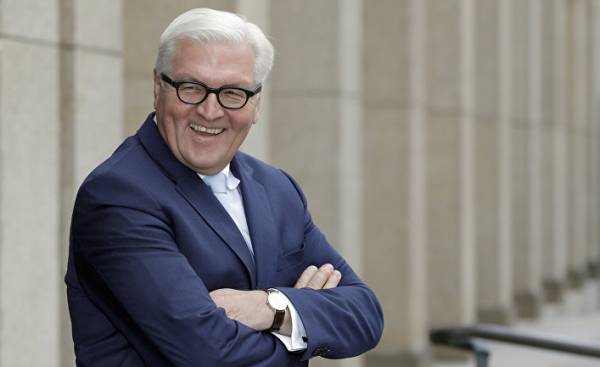
Frank-Walter Steinmeier almost 100 days as President. In an interview, he says that the restructuring was more difficult than he expected. He called for the strengthening of the military potential of Germany, expresses the confidence in the Bundeswehr, we see increasing alienation between Europe and Russia and warns that when looking at America to concentrate on the trump.
Frankfurter Allgemeine Zeitung: Mr. President, the world order is in a critical period, one crisis follows another, in place of the old political certainties comes unpredictability. You have heart blood pours from the fact that You can no longer intervene as Minister of foreign Affairs?
Frank-Walter Steinmeier: I knew that the task will be different, and restructuring — complex. To be honest, it was even harder than I expected. What is clear is that for me helps my experience, I don’t need to study how politics works, and I’m familiar with actors. But still the task of the head of state are fundamentally different from those of the political functions, which I have done. So I, of course, not enough of those people with whom I worked closely for many years. But I don’t grieve every day for skills and powers possessed by the Executive positions. Because I was in this highest public office not by accident, but entered into it with joy and confidence that new challenges will come new opportunities and I will be able to use that experience. In short, from everyday political decisions to a new position, in fact, associated is in control and making laws. But strongly linked to people’s attitude to democracy and their welfare.
Nearly 100 days of Your tenure. How very different Your previous functions?
— Themes and their range is much wider than in foreign policy, negotiating partners — diverse. But I like it, and I enjoy the opportunity to think long-term policy decisions. I came here with curiosity and respect for this post. And each of the 100 days now behind me, was a step towards rapprochement with the position. Now I’m here. Arrived OK. The first week I traveled on Federal lands, visited schools, universities, kindergartens and orphanages, talked with volunteers and mayors. I want it to continue. Bellevue (Bellevue) will remain my residence, but I want to travel around the country to communicate with ardent supporters and doubters. Interest in meetings with Federal President is huge. Whether it’s a vocational school in Kreuzberg, or the Aachen Cathedral, Bochum or Darmstadt — people have a huge need to communicate. If I compare it with the time when I was in the position of Minister, today it is much easier to engage in a conversation. And that’s good. Many just want to solve their problems and want to be taken seriously, and I’m interested in what makes people tick.
— With the Federal President Steinmeier to talk to people easier than with Steinmeier as the Minister of foreign Affairs? What does it depend?
— The answer is not easy. I think there are two aspects: first, in a new role and without specific Ministerial vocabulary — I can be more open to people, second, they just feel my curiosity and my interest in people. Both reduces the psychological barrier.
And because You are not seen as part of the Berlin political establishment?
I don’t know, do the self-proclaimed opponents of the so-called political establishment is so…
Or less as a party policy?
— This is closer.
— But You are still a social Democrat, at least in the shower?
— Like all other Federal presidents, my party is resting.
The EU is in deep crisis, the Transatlantic Alliance has been sorely tested — whether the need for communication of citizens remain a priority? Compared with developments in other countries, we should still say that Germany — the island of the lucky ones.
— I started with this because Europe is in deep crisis since the start of the integration. After a visit to France immediately gave a speech before the European Parliament. And this message was clear throughout Europe. Earlier visits to Greece and Poland also belong to this context, as well as my publicly expressed concern about restrictions on the freedom of science and culture in Hungary. As President, I feel compelled to remind you about the great historical heritage of European unity and to facilitate its transfer to future generations.
In the beginning of the year it seemed that the triumphal procession of populism do not stop. Now don’t think so. But whether the threat is behind us?
In early discussions of populism I warned against alarmism. But now I don’t agree with what we already give the all-clear alarm. Fortunately, during the elections in France and in the Netherlands, right-wing populists are unable to get through. However, they scored alarmingly high percentage of votes. Around the world and unfortunately also in Europe too we are seeing a new fascination with authoritarianism. I was very worried. Therefore, during my stay in the Federal States of Germany, one of my priorities is a discussion with young people. And what about the state of our democracy. I can tell You it is worth it. Just because we in Germany this shift is not so strong as anywhere else.
In the West also apply autocratic projects against our freedom-loving models of state and society. Nationalism and protectionism come. The best days of liberal democracy in the past? We stand at the end of the West, as some fear?
— I am not a supporter of catastrophic thinking, but today, in many ways, the normative Foundation of the West is questioned. Stand whether he depends on us. Definitely, the last word is not for Donald trump. To believe in the West means to believe in the ability to change and course corrections. In this American democracy we are even a little ahead.
What does it mean?
It means to ask the right questions. How will democracy, if the number of elderly people in the future will exceed the number of young? What will be the consequences if in one society, less people will be talking about the same thing? Whether representative democracy will strengthen or will weaken further? I want to provide you with a forum to discuss these and other issues. The Bellevue Palace has become a place for discussions about the future of democracy. After the summer break, so be it. Let’s start with the question: what is the Foundation of the West and for whom he has remained an example to follow?
— Such issues are now given by many Americans. Until now, American democracy good response to the President, who, it seems, do not care about separation of powers and other fundamental principles of the Constitution?
— One thing is clear: to change anything in the development that we are now seeing in America are just Americans. It is crucial that the system of checks and balances operates. All I can advise is when you look at America not to focus only on Donald trump. I recently invited a group of congressmen and we very openly discussed the situation in the United States. My impression: it is unlikely that Americans will accept that decision in their country only accepts the decrees and opinions of democratic institutions no longer interested.
— Donald trump was elected by a majority. Despite his risky maneuvers, his supporters seem to support him. Americans never think like us?
— Of course, the Americans think otherwise, it all starts with the fact that they have a different story. The story, which, however, you’ll be an even longer struggle for freedom and democracy than ours. I have hope that this part of history will not be lost in times when the struggle with democratic institutions, it has become something ordinary.
— When You are planning to visit Washington?
— You might also ask when I will fly to Moscow.
— Collected.
Rest assured that we will find the right moment to visit our great allies, and our great neighbors.
— Who is who?
I thought this would not require explanation.
— We ask for confidence.
So, to our transatlantic partner and our large neighbour.
— Obviously, America at the trump looking for a new role, which is rather different departure from world politics than far-sighted engagement. Then Germany will probably not avoid making known to be more responsible, which has already so often say?
— In December 2013, when I became foreign Minister, I said that a democratically and economically stable Germany must take on more responsibility. And we do that. For Europe, changes are more significant because she wasn’t really tangible political security. But here began rethinking.
— Germany should arm themselves?
— No one can deny that the situation with the political security of Germany and Europe has changed. Risks have increased. I recall only that since the illegal annexation of Crimea by Russia has again raised the issue of war and peace, which we on European soil was considered closed. Even more, the risks are increasing all over the world. To this we must respond, but not unilaterally.
— What then?
— Germany needs to strengthen its military capabilities. This was taken the correct and necessary decisions. But that would be too narrow a vision, if we reduced the increased liability only to the military sphere. It is precisely because we belong to a few politically and democratically stable States in the world, we expect that we will participate in conflict resolution more than 10 or 20 years ago. This includes what we look back and assess where military intervention in the past has been useful and where not.
— What do You mean?
— In my previous answers I said: I understand the requirements of partners on the division of responsibility and burden in NATO. But it suggests that when participating in having a big impact military operations, we and our partners will reach agreement on all issues. In the past this was not always the case, for example, in the case consequences for the entire Middle East from the invasion of Iraq in 2003.
— The defence Minister recently accused the Bundeswehr in “the problem of weakness of leadership.” The occasion was the arrest of the officer who apparently planned terrorist act and was leading a double life as a refugee and discovered the symbolism of the Wehrmacht and the message about the terrible rituals in some parts of that still were partially exaggerated. As foreign Minister You are often in contact with the Bundeswehr. What is Your impression of the army?
— I trust the Bundeswehr, and 80% of Germans too. A high level of approval is essential to enable the Bundeswehr in society and useful to our country. But this raises the responsibility for policy: if the credibility and trust needs to be saved, then you must specify the deficiencies, and egregious misdeeds must be punished by that happening. In the specific case with the senior Lieutenant A. Franco we are talking about the accusation of a grave crime. There’s nothing to downplay and justify. Crimes should be punished — inside and outside of the Bundeswehr.
— Recently, the University named after Helmut Schmidt took the picture with his portrait, because it shows him in the uniform of the Wehrmacht.
— It is impossible to remove the past as the picture. It is the past that is the reason that looking at us from abroad and Express their concerns — as recently during my visit to Israel. But the more we have to understand that — in understanding the past — the Bundeswehr continues the tradition of the Wehrmacht, but on the contrary, Parliament has adopted a conscious rejection of the past, for example, in the constitutional status of the army. At the same time, the Bundeswehr has not appeared out of nowhere. General Baudissin (Baudissin), the author of “Inner leadership” (Innere Führung), also served in the Wehrmacht, as well as Helmut Schmidt. This in no way diminishes their contribution to the creation of an army for a democratic Germany.
— In your opinion, the Bundeswehr is the problem of weakness of leadership?
— As I said, I trust the Bundeswehr. The recent incidents are alarming, but, in my opinion, are not indicative of the Bundeswehr as a whole. On the contrary, in the days when I was foreign Minister, I met with a large number of chiefs of divisions, who in difficult conditions — be it Kosovo, Afghanistan or Mali — acted with discretion and great responsibility, both in relation to their own soldiers and people in war zones. I have great respect for these soldiers.
— Russia is suspected of influencing the outcome of the U.S. presidential election. The government and intelligence services consider it possible that the election campaign in Germany could be of different influence attempts. This would further aggravate German-Russian relations. You long considered the “understanding Russia.” You know what would convince Russian President Putin to act?
We no longer live in the days when we together with Mikhail Gorbachev built a common house called Europe. And 2001 for a long time already behind, when Vladimir Putin gave a speech in the Bundestag, and hope for the very rapid convergence of East and West was strengthened. Now behind half a decade of growing estrangement between Europe and Russia. Today, Russia is looking for its own identity to distinguish from Europe and the West in General. The situation worsened in 2014 after the annexation of Crimea and Russian military action in Eastern Ukraine. So at the moment the unexpected rapprochement between Europe and Russia is not expected.
— What to do for the West?
— First, we should clearly define what divides us; second, to realize that Moscow is just a two hour flight from Berlin and is a big neighbor Germany, which has both positive and negative influence on the situation in Europe; and third, to consider such relations with Russia final, and working to change them. It’s hard, but we need to soberly assess where we can work together. If Moscow will affect a Federal election, common ground will inevitably decline. It would be bad for both sides.
— Will You seek opportunities for conversation with the Russian President?
— I have no illusions about the state of our relationship. But the silence, in my opinion, not an alternative.
— There is currently no illusions about the fact that the European Union is in serious crisis for all time of existence. Tips to overcome it spread from offering its collapse to deeper integration. What do You recommend?
— Case scenario for the European Union, which is exactly what we must exclude: continue in the same spirit. After Brexia we need to understand that the European project cannot go ahead. The results of the elections lately have shown that we do not have the necessary authority for a large integration step, which some require. But there is progress. Most of unity is achieved in the field of internal and external security. In Economics the average for EU countries there is a positive trend, but we need more decisions still high level of youth unemployment in the southern member States of the EU. Particularly high expectations of the population concerning migration policies, there are General ideas about the protection of external borders, I see potential in the harmonization of European refugee law, but the real load sharing, we are still far. I’m sure if we make progress in these three policy fields and prove to them their capacity, even the doubters will be convinced.
— The UK is going to withdraw from the EU. Cooperation with London, the EU has often brought difficulties. Should be even easier after they are released?
— I think rather the contrary. What we will miss with the release of the British, irreplaceable. Because of their past they have a very cosmopolitan approach to the world. In his political liberalism, they have often been in the EU on the side of Germany. That we will miss.
— After the vote on Brexia many feared that other countries can come to the idea to follow the British example. This danger does not seem so big. Or do You see it differently?
— In fact, such a danger of infection that I can see. At the moment it seems to me that, most likely, the rest of the country, looking at Brakcet with all its consequences, have no desire to repeat a similar experience, and prefer to think about what to do to overcome this European crisis. During my first trip to Europe I felt a whole new determination to build the future of the 27 countries together.
Together with negotiations on entering negotiations on EU membership with Turkey. Still they are not completed, at least officially. Politically Turkey is increasingly moving away from the EU, its membership currently generally difficult to imagine. So why continue to pretend?
— I do not think that the government is doing. Adverse trends are identified, and evidence of embellishment of the situation I do not see. Almost 30 years ago I first came to Turkey, and for a long time see the economic recovery of the country and its rapprochement with Europe and efforts to develop modern, moderate Islam that supports the relationship between Islam and democracy. The country is far advanced, the more tragic is the development path that Turkey has chosen in recent years. The current President is responsible for the fact that now there are serious obstacles to the development of legal state and limited civil liberties. Thus Turkey is undoubtedly moving away from Europe. Signs of convergence not currently seen.
So, the cessation of accession negotiations?
— In fact, the negotiations have been frozen. How to proceed is a question of political prudence. Some want Europe to take urgent measures. I can agree, if the Commission in Brussels will say that — given the oppressed in Turkey and local Pro-European forces — Turkey should not become Europe, this will finally slam the door. That is, summing up, Turkey should take action and take responsibility for its own population. If the death penalty will be reintroduced, all of these issues to resolve themselves.

